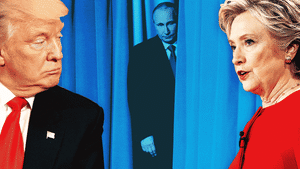Welcome to Rabbit Hole, a breaking-news analysis that helps you get smart on the one story everyone’s obsessing over—for Beast Inside members only.
Special Counsel Robert Mueller says Trumpworld didn’t take Moscow up on any of the flirtatious outreach efforts waged by Russian nationals during the 2016 election. That’s one big question out of the way, but it still doesn’t mean we have a better idea of what did (and didn’t) happen during the 2016 campaign or what’s going to happen next. As Congress clamors for more information about what’s in Mueller’s report, here are three questions to keep in mind about the narrative laid out by the special counsel’s office.
What is all just about hacking and trolls?
Attorney General William Barr’s letter describes the structure of the special counsel’s report in broad strokes, but its description of the sections on Russian electoral interference are focused mostly on hacking and cyberspace.
Barr wrote that Mueller concluded there were "two main Russian efforts to influence the 2016 election": one that dealt with Russian hackers breaking into email accounts from the Clinton campaign and the Democratic National Committee, and one that involved an array of Russian sock puppets trying to sow political chaos and division on social media.
It’s not hard to figure out the central characters and events here since we already have indictments that describe them. Mueller indicted 12 GRU officers for hacking Democrats in 2016, 13 Russian citizens and three troll farm companies for their role in spreading disinformation, and Roger Stone for lying about his conversations with WikiLeaks about the pending release of the hacked material. It’s also essentially a retread of what the intelligence community concluded in its January 2017 assessment.
Push vs pull?
If hacking and disinformation represented the two “main Russian efforts” in 2016, what does that imply about all the shady outreach efforts that allegedly took place in person?
Barr’s letter makes an off-handed reference to "multiple offers from Russian-affiliated individuals to assist the Trump campaign" in 2016. Here again, it’s not hard to guess at what it’s referencing. Throughout the past two years we’ve seen accounts about an array of meetings between Russian officials who promised Michael Cohen and George Papadopoulos that they could set up a a meeting between Trump and Vladimir Putin; about alleged former Russian intelligence officer Konstantin Kilimnik, who pitched Trump’s campaign chairman on a Russia-friendly peace plan for Ukraine; and about the infamous Trump Tower meeting where a not-so-former Russian official promised Donald Trump Jr. dirt on Hillary Clinton, compliments of the Kremlin.
The bottom line conclusion of the report is that Trump campaign officials did not engage in any criminal conspiracies with Russian officials. That means Mueller found no pull factor from the Trump campaign in responding to this outreach that meets the definition of a criminal conspiracy. But it leaves open the question about whether there was a push factor from the Kremlin. Were the various Russians who offered Putin meetings just trying to bluff their way into the good graces of a potential future president? Was the Kremlin or any other Russian government agency aware of Natalia Veselnitskaya’s offer of Clinton dirt or was she bluffing, too? Barr’s letter only speaks of “Russian-affiliated” individuals, which says nothing at all about whether the Kremlin directed or approved of their outreach.
In short, we don’t know and we won’t unless and until we read the report. But if Barr’s description of the report is accurate, it suggests that the hacking and disinformation campaigns in 2016 were of greater importance to the Kremlin, at least in terms of trying to interfere in the election.
When do the pardon applications start?
The question hanging over every prosecution of a close Trump associate for the past two years has been: is the president going to pardon them? With the special counsel’s investigation over, we’re a lot closer to the answer to that question. The most pressing pardon question comes in Paul Manafort’s case, as he’s the most senior Trump aide still in prison. If you flip through the sentencing memo filed by Manafort’s attorneys, it reads like the longform version of a Trump tweet. Manafort’s lawyers savaged the Special Counsel’s Office as vindictive and motivated by their inability to find evidence of collusion—talking points that could resonate with his avowedly sympathetic former boss.
The next likeliest candidate for a pardon is Trump’s former National Security Adviser Michael Flynn. We know Trump feels badly for Flynn because he told James Comey to go easy on Flynn back when Comey was still FBI director. But we’re not likely to get an answer on whether Flynn will get a pardon anytime soon. The Trump administration thus far hasn’t offered any pardons to those wrapped up in the Russia investigation before they’ve been sentenced. Flynn still hasn’t been sentenced because he could be called on to testify in the Virginia lobbying trial of his former business partner, Bijan Kian. The earliest we could know if he’s due for sentencing is June 14, when his lawyers are scheduled for a status hearing.







